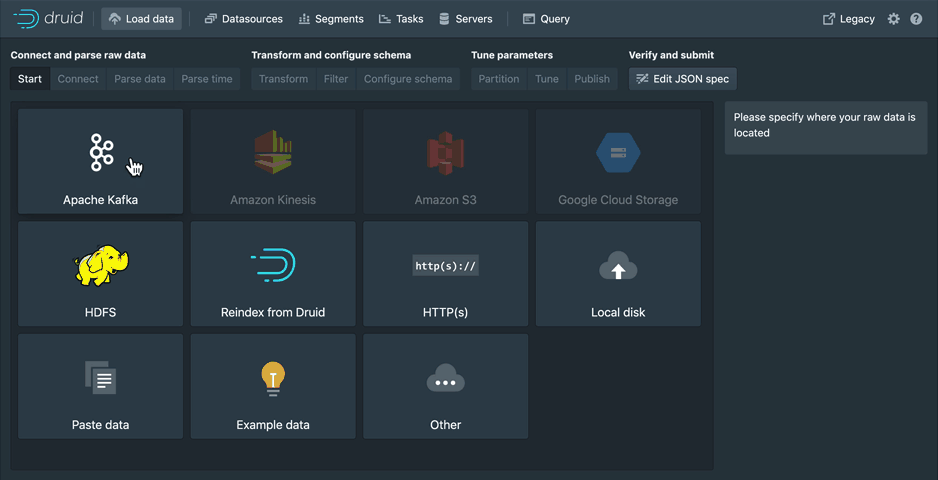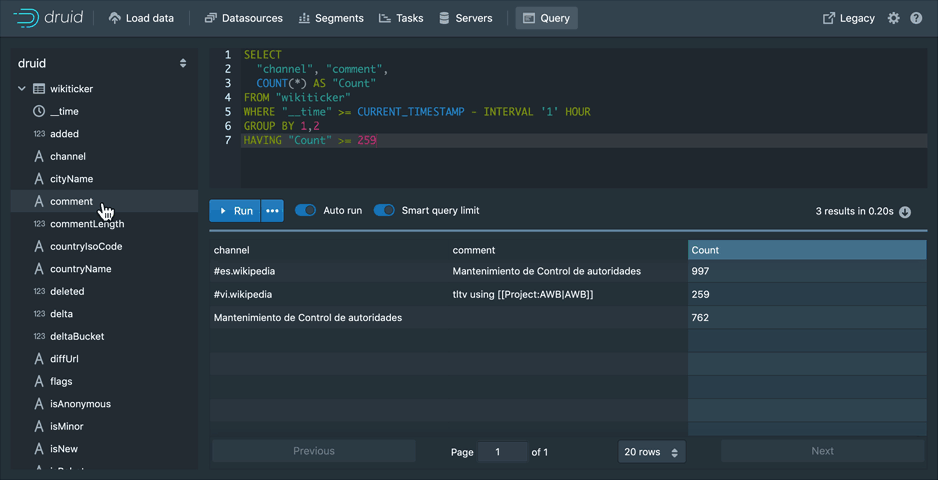changes: * Added `CursorBuildSpec` which captures all of the 'interesting' stuff that goes into producing a cursor as a replacement for the method arguments of `CursorFactory.canVectorize`, `CursorFactory.makeCursor`, and `CursorFactory.makeVectorCursor` * added new interface `CursorHolder` and new interface `CursorHolderFactory` as a replacement for `CursorFactory`, with method `makeCursorHolder`, which takes a `CursorBuildSpec` as an argument and replaces `CursorFactory.canVectorize`, `CursorFactory.makeCursor`, and `CursorFactory.makeVectorCursor` * `CursorFactory.makeCursors` previously returned a `Sequence<Cursor>` corresponding to the query granularity buckets, with a separate `Cursor` per bucket. `CursorHolder.asCursor` instead returns a single `Cursor` (equivalent to 'ALL' granularity), and a new `CursorGranularizer` has been added for query engines to iterate over the cursor and divide into granularity buckets. This makes the non-vectorized engine behave the same way as the vectorized query engine (with its `VectorCursorGranularizer`), and simplifies a lot of stuff that has to read segments particularly if it does not care about bucketing the results into granularities. * Deprecated `CursorFactory`, `CursorFactory.canVectorize`, `CursorFactory.makeCursors`, and `CursorFactory.makeVectorCursor` * updated all `StorageAdapter` implementations to implement `makeCursorHolder`, transitioned direct `CursorFactory` implementations to instead implement `CursorMakerFactory`. `StorageAdapter` being a `CursorMakerFactory` is intended to be a transitional thing, ideally will not be released in favor of moving `CursorMakerFactory` to be fetched directly from `Segment`, however this PR was already large enough so this will be done in a follow-up. * updated all query engines to use `makeCursorHolder`, granularity based engines to use `CursorGranularizer`.
Apache Druid
Druid is a high performance real-time analytics database. Druid's main value add is to reduce time to insight and action.
Druid is designed for workflows where fast queries and ingest really matter. Druid excels at powering UIs, running operational (ad-hoc) queries, or handling high concurrency. Consider Druid as an open source alternative to data warehouses for a variety of use cases. The design documentation explains the key concepts.
Getting started
You can get started with Druid with our local or Docker quickstart.
Druid provides a rich set of APIs (via HTTP and JDBC) for loading, managing, and querying your data. You can also interact with Druid via the built-in web console (shown below).
Load data
Load streaming and batch data using a point-and-click wizard to guide you through ingestion setup. Monitor one off tasks and ingestion supervisors.
Manage the cluster
Manage your cluster with ease. Get a view of your datasources, segments, ingestion tasks, and services from one convenient location. All powered by SQL systems tables, allowing you to see the underlying query for each view.
Issue queries
Use the built-in query workbench to prototype DruidSQL and native queries or connect one of the many tools that help you make the most out of Druid.
Documentation
See the latest documentation for the documentation for the current official release. If you need information on a previous release, you can browse previous releases documentation.
Make documentation and tutorials updates in /docs using Markdown or extended Markdown (MDX). Then, open a pull request.
To build the site locally, you need Node 16.14 or higher and to install Docusaurus 2 with npm|yarn install in the website directory. Then you can run npm|yarn start to launch a local build of the docs.
If you're looking to update non-doc pages like Use Cases, those files are in the druid-website-src repo.
Community
Visit the official project community page to read about getting involved in contributing to Apache Druid, and how we help one another use and operate Druid.
- Druid users can find help in the
druid-usermailing list on Google Groups, and have more technical conversations in#troubleshootingon Slack. - Druid development discussions take place in the
druid-devmailing list (dev@druid.apache.org). Subscribe by emailing dev-subscribe@druid.apache.org. For live conversations, join the#devchannel on Slack.
Check out the official community page for details of how to join the community Slack channels.
Find articles written by community members and a calendar of upcoming events on the project site - contribute your own events and articles by submitting a PR in the apache/druid-website-src repository.
Building from source
Please note that JDK 8 or JDK 11 is required to build Druid.
See the latest build guide for instructions on building Apache Druid from source.
Contributing
Please follow the community guidelines for contributing.
For instructions on setting up IntelliJ dev/intellij-setup.md


























